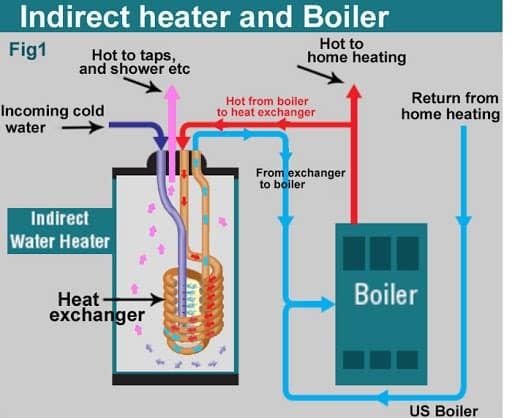
The Difference Between Boilers And Quincy Water Heaters
As a homeowner, it can sometimes feel like you need to be a master of all crafts. Understanding the differences between a boiler and a water heater is an important step in becoming a more informed handyman. To the untrained eye, a water heater and a boiler appear to work similarly, in that they both heat water. However, both devices have very different functionalities, purposes, and mechanics. Learning the differences between a water heater and a boiler can save you time and money when troubleshooting water heating problems.
Quincy Water Heaters and Boilers – What You Need to Know
When you turn the hot water knob on your faucet and hot water effortlessly pours out, it’s easy to dismiss all the engineering that went into this accomplishment. Every time you shower, wash your hands, cook, or clean, your boiler or water heater works its hidden magic behind the scenes to keep you warm. Now you will understand how these mysterious devices function and what makes each unit unique.
How Quincy Water Heaters Work
Water heaters are the most common way to heat water in the United States. These devices come in two types – tanked and tankless. You will need to consider some key factors before you can decide which is the best option for your home. For example, your living situation, budget, water heating needs, and available space are all important points to evaluate.
Tanked
In a tanked setup, the unit takes cold incoming water and indirectly warms it by a gas burner or electric heating rods. These heating elements are located safely inside of the tank. In gas-operated water tanks, you may need to relight your pilot light if the flame ever goes out. Importantly, once the water reaches the proper temperature, it’s then kept in the tank until it’s needed.

Quincy Water Heater
This style of system is great for large homes because you get a lot of available hot water at your disposal. If you have a big family that all showers at the same time, this is the best option for your home. However, keeping 40 gallons of water warm does come with higher electricity costs. Luckily, manufacturers continue to develop energy-efficient models.
When you turn your hot water handle, a tanked hot water system sends the hot water into a tube to mix with the cold water already in the pipes of your home. The then cooled, but still, warm water is what comes out of your shower. If the mixing didn’t take place, the water would be uncomfortably hot until the tank drained. Then, instantly, the water would be cold.
Tankless Quincy Water heater
Tankless water heaters are the newest of the two systems. This unit does away with the large cumbersome tank. Instead, the device heats the water on demand. Basically, when you turn on your faucet, cold water goes through a densely packed heating element. This water is then mixed with cooler water and sent to your shower, or sink.

Quincy Water Heater – Tankless
These units provide you with more energy efficiency because the water isn’t kept heated in a tank. However, these devices do draw high amps when they heat the water for your home. Importantly, this amp draw requires you to install these units using large gauge wiring. Tankless water heaters are more space-efficient, so they can be mounted nearly anywhere. In fact, you can purchase smaller systems designed for a single shower or sink.
Drawbacks to Consider
There are some drawbacks to this style of system. Every tankless system has a GPM (Gallons Per Minute) rating. If you go above the GPM listed, you will notice that you lose some heating ability. Also, tankless systems are more expensive than their older counterparts. Despite these drawbacks, if your home fits the criteria, a tankless water heater is a smart way to reduce your utility bills.
What is a Quincy Boiler?
A boiler functions in a completely different manner than a hot water heater. In a boiler system, the hot water gets converted into steam. Steam is a better conductor of heat. Additionally, it’s lighter and therefore easier to transport throughout the pipes in your home. Also, boiler systems are more efficient than air-based systems because they can maintain temperature more efficiently than air. Notably, boilers are more popular in the EU, but there are still many homes right here in Quincy with these units installed.
How does a Quincy Boiler Work?
Your boiler has a thermostat just like a water heater that notifies it when to engage its heating system. Today, the most popular boilers function using a closed-loop system. This system allows the heater to maintain a constant temperature without the need to use new water constantly. In this style of system, the boiler will first start heating the water using a combustion chamber indirectly.

Quincy Boiler
The design is very efficient because once the steam cools, it turns back into water, and moves back to the boiler. At this time the water is already close to boiling temperature, so its easy for a boiler to provide you more hot water without delay. Also, its less effort to recirculate this water. In this way, newer boilers improve efficiency.
What’s the Right Heating Solution For My Home?
Now that you have a better understanding of the differences between hot water heaters and boilers, you are now ready to begin to look at what options are available for your home. Trust1 Services has a team of licensed professionals ready to assist you in all of your Quincy hot water tank and boiler needs. Contact us today.
The post The Difference Between Boilers And Quincy Water Heaters appeared first on Welcome to Trust1 Services.